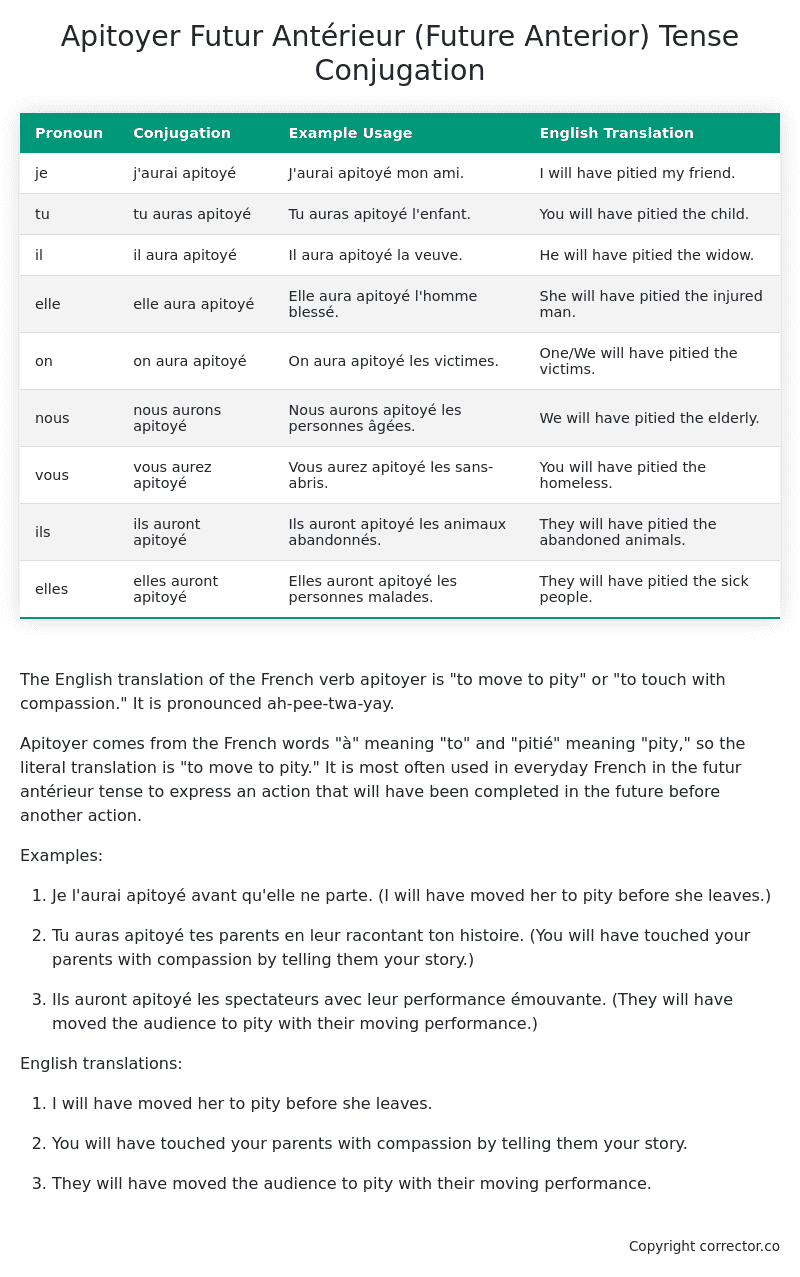Futur Antérieur (Future Anterior) Tense Conjugation of the French Verb apitoyer
Introduction to the verb apitoyer
The English translation of the French verb apitoyer is “to move to pity” or “to touch with compassion.” It is pronounced ah-pee-twa-yay.
Apitoyer comes from the French words “à” meaning “to” and “pitié” meaning “pity,” so the literal translation is “to move to pity.” It is most often used in everyday French in the futur antérieur tense to express an action that will have been completed in the future before another action.
Examples:
-
Je l’aurai apitoyé avant qu’elle ne parte. (I will have moved her to pity before she leaves.)
-
Tu auras apitoyé tes parents en leur racontant ton histoire. (You will have touched your parents with compassion by telling them your story.)
-
Ils auront apitoyé les spectateurs avec leur performance émouvante. (They will have moved the audience to pity with their moving performance.)
English translations:
-
I will have moved her to pity before she leaves.
-
You will have touched your parents with compassion by telling them your story.
-
They will have moved the audience to pity with their moving performance.
Table of the Futur Antérieur (Future Anterior) Tense Conjugation of apitoyer
| Pronoun | Conjugation | Example Usage | English Translation |
|---|---|---|---|
| je | j’aurai apitoyé | J’aurai apitoyé mon ami. | I will have pitied my friend. |
| tu | tu auras apitoyé | Tu auras apitoyé l’enfant. | You will have pitied the child. |
| il | il aura apitoyé | Il aura apitoyé la veuve. | He will have pitied the widow. |
| elle | elle aura apitoyé | Elle aura apitoyé l’homme blessé. | She will have pitied the injured man. |
| on | on aura apitoyé | On aura apitoyé les victimes. | One/We will have pitied the victims. |
| nous | nous aurons apitoyé | Nous aurons apitoyé les personnes âgées. | We will have pitied the elderly. |
| vous | vous aurez apitoyé | Vous aurez apitoyé les sans-abris. | You will have pitied the homeless. |
| ils | ils auront apitoyé | Ils auront apitoyé les animaux abandonnés. | They will have pitied the abandoned animals. |
| elles | elles auront apitoyé | Elles auront apitoyé les personnes malades. | They will have pitied the sick people. |
Other Conjugations for Apitoyer.
Le Present (Present Tense) Conjugation of the French Verb apitoyer
Imparfait (Imperfect) Tense Conjugation of the French Verb apitoyer
Passé Simple (Simple Past) Tense Conjugation of the French Verb apitoyer
Passé Composé (Present Perfect) Tense Conjugation of the French Verb apitoyer
Futur Simple (Simple Future) Tense Conjugation of the French Verb apitoyer
Futur Proche (Near Future) Tense Conjugation of the French Verb apitoyer
Plus-que-parfait (Pluperfect) Tense Conjugation of the French Verb apitoyer
Passé Antérieur (Past Anterior) Tense Conjugation of the French Verb apitoyer
Futur Antérieur (Future Anterior) Tense Conjugation of the French Verb apitoyer (this article)
Subjonctif Présent (Subjunctive Present) Tense Conjugation of the French Verb apitoyer
Subjonctif Passé (Subjunctive Past) Tense Conjugation of the French Verb apitoyer
Subjonctif Imparfait (Subjunctive Imperfect) Tense Conjugation of the French Verb apitoyer
Subjonctif Plus-que-parfait (Subjunctive Pluperfect) Tense Conjugation of the French Verb apitoyer
Conditionnel Présent (Conditional Present) Tense Conjugation of the French Verb apitoyer
Conditionnel Passé (Conditional Past) Tense Conjugation of the French Verb apitoyer
L’impératif Présent (Imperative Present) Tense Conjugation of the French Verb apitoyer
L’infinitif Présent (Infinitive Present) Tense Conjugation of the French Verb apitoyer
Struggling with French verbs or the language in general? Why not use our free French Grammar Checker – no registration required!
Get a FREE Download Study Sheet of this Conjugation 🔥
Simply right click the image below, click “save image” and get your free reference for the apitoyer Futur Antérieur tense conjugation!

Apitoyer – About the French Futur Antérieur (Future Anterior) Tense
Construction
Common Everyday Usage Patterns
Interactions with Other Tenses
For example
Summary
I hope you enjoyed this article on the verb apitoyer. Still in a learning mood? Check out another TOTALLY random French verb conjugation!


